新版新目标英语八年级下册unit 2教案
八年级英语下册全册教案人教版新目标

Unit 1 Will people have robots ?单元教学目标:1、Words&phrases: robot, paper, less, fewer, simple, unpleasant, factory, seem, etc .2、will 构成的一般将来时态的陈述句、否定句、疑问句及回答.3、There be 句型的一般将来时.4、more , less , fewer 的用法.5、学习一般将来时态的相关知识,学会对未来进行预测.单元重难点:1、will构成一般将来时态的句式。
2、There be 句型的一般将来时态。
3、more , fewer , less 的用法。
4、How to make predictions .第一课时课前准备:教师:录音机、所学物品的图片。
学生:英语点金教练、练习本及相关的学习用具教学步骤:Step 1 Leading in(导入话题,激活背景知识)(导入话题,激活背景知识)1.Greetings: Welcome to school .What’s the date today ? Who’s o n duty today ?Do you enjoy your winter holiday ?(你喜欢你的寒假吗?)Do you finish your Homework(家庭作业)?(你完成你的假期作业了吗?)Do you want to live on the moon ?(你想去月球吗?)Can you guess what will happen in ten years ?(你能猜出十年后将会发生什么吗?)Collect the Ss’ answers and say somethi ng about their predictions .Step 2 Pre-task(任务前活动)SB Page 2 ,1a .1.Look at the picture :How will the world be different in the future ,100 years from now ?We’re going to talk about sth in 100 years .2.Read each predictions to the class .Explain the new vocabulary .3.Read the instructions .Make sure Ss know what they should do .4.Do it by themselves .5.Talk about the answers with the class .Explain :一般将来时态构成: will / be going to +动词原形=Step 3 While-task(任务中活动)SB Page 2 ,1b .1.Practise reading the six predictions .2.Read the instructions to Ss .Circle the things you hear on the recording .3.Play the tape twice .(放录音,两次)4.Play the tape a third time .At the same time ,check the answers .SB Page 2 , 1c .1、Pay attention to the dialogues .2、Read the dialogues fluently .3、Pairwork .Work in pairs to make predictions according to the sample .4、Ask several pairs to share their conversations to the class .SB Page 3 , 2a & 2b .1、Read the predictions .2、Read the instructions and point out the sample answer .3、Play the tape twice .Ss circle the word they hear in each sentences: more , less , fewer .4、Check the answers .学生探究: less , fewer 的区别。
2020年春人教新目标英语八年级下册Unit2-全单元教案
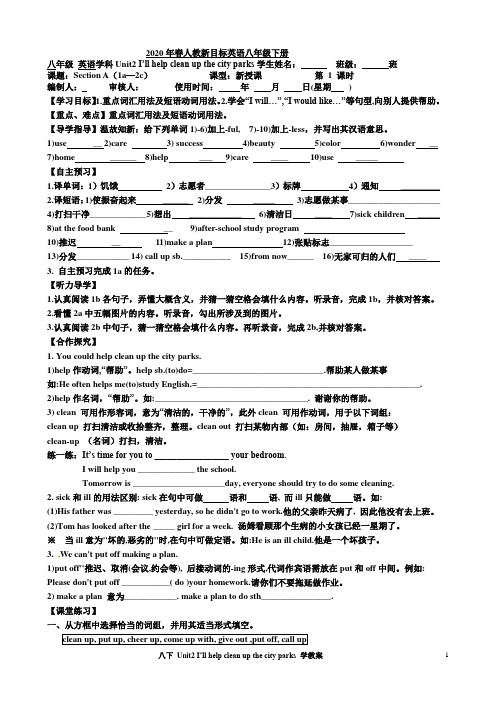
2020年春人教新目标英语八年级下册八年级英语学科Unit2 I’ll help clean up the city parks学生姓名:班级:班课题:Section A(1a—2c)课型:新授课第1 课时编制人:审核人:使用时间:年月日(星期)【学习目标】1.重点词汇用法及短语动词用法。
2.学会“I will…”,“I would like…”等句型,向别人提供帮助。
【重点、难点】重点词汇用法及短语动词用法。
【导学指导】温故知新:给下列单词1)-6)加上-ful, 7)-10)加上-less,并写出其汉语意思。
1)use __ 2)care 3) success 4)beauty 5)color 6)wonder __ 7)home ______ 8)help ___ 9)care ____ 10)use _____【自主预习】1.译单词:1)饥饿2)志愿者_______________3)标牌4)通知_________2.译短语:1)使振奋起来______ 2)分发_____ 3)志愿做某事_____________________ 4)打扫干净_____________5)想出____________ 6)清洁日____ 7)sick children _____ 8)at the food bank __ 9)after-school study program10)推迟__ 11)make a plan 12)张贴标志___________________13)分发____________ 14) call up sb.___________ 15)from now______ 16)无家可归的人们____ 3. 自主预习完成1a的任务。
【听力导学】1.认真阅读1b各句子,弄懂大概含义,并猜一猜空格会填什么内容。
听录音,完成1b,并核对答案。
2.看懂2a中五幅图片的内容。
听录音,勾出所涉及到的图片。
人教版新目标八年级英语下册全册电子版教案
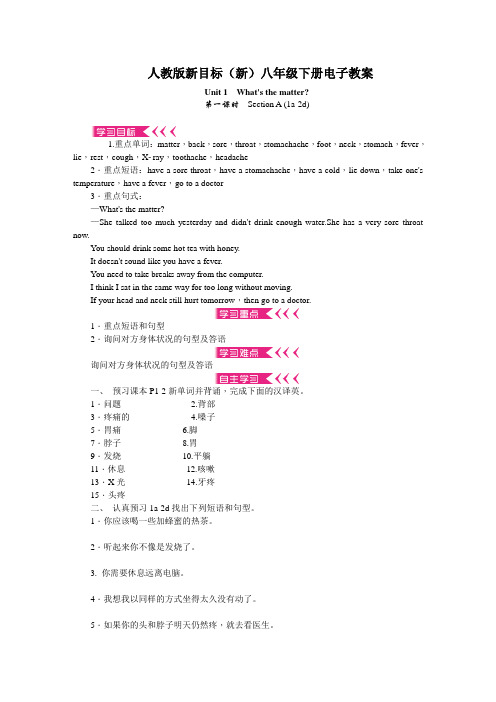
人教版新目标(新)八年级下册电子教案Unit 1What's the matter?第一课时Section A (1a-2d)1.重点单词:matter,back,sore,throat,stomachache,foot,neck,stomach,fever,lie,rest,cough,Xray,toothache,headache2.重点短语:have a sore throat,have a stomachache,have a cold,lie down,take one's temperature,have a fever,go to a doctor3.重点句式:—What's the matter?—She talked too much yesterday and didn't drink enough water.She has a very sore throat now.You should drink some hot tea with honey.It doesn't sound like you have a fever.You need to take breaks away from the computer.I think I sat in the same way for too long without moving.If your head and neck still hurt tomorrow,then go to a doctor.1.重点短语和句型2.询问对方身体状况的句型及答语询问对方身体状况的句型及答语一、预习课本P1-2新单词并背诵,完成下面的汉译英。
1.问题____________ 2.背部____________3.疼痛的____________ 4.嗓子____________5.胃痛____________ 6.脚____________7.脖子____________ 8.胃____________9.发烧____________ 10.平躺____________11.休息____________ 12.咳嗽____________13.X光____________ 14.牙疼____________15.头疼____________二、认真预习1a-2d找出下列短语和句型。
2020年春人教新目标英语八年级下册Unit2全单元教案(无答案)
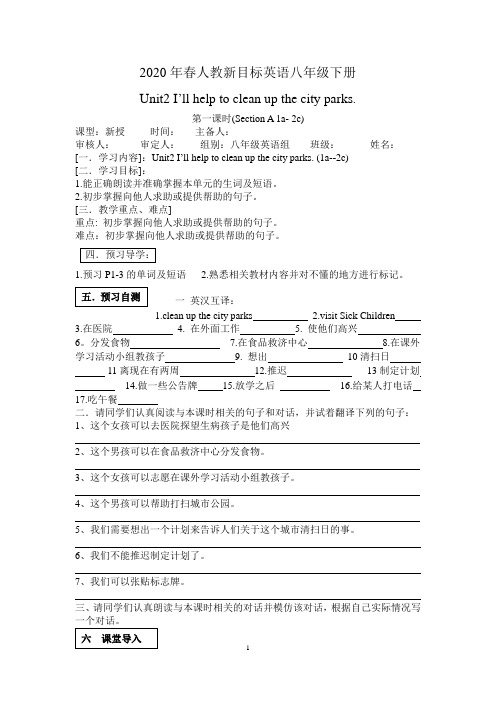
2020年春人教新目标英语八年级下册Unit2 I’ll help to clean up the city parks.第一课时(Section A 1a- 2c)课型:新授时间:主备人:审核人:审定人:组别:八年级英语组班级:姓名:[一.学习内容]:Unit2 I’ll help to clean up the city parks. (1a--2c)[二.学习目标]:1.能正确朗读并准确掌握本单元的生词及短语。
2.初步掌握向他人求助或提供帮助的句子。
[三.教学重点、难点]重点: 初步掌握向他人求助或提供帮助的句子。
难点:初步掌握向他人求助或提供帮助的句子。
1.预习P1-3的单词及短语2.熟悉相关教材内容并对不懂的地方进行标记。
一英汉互译:1.clean up the city parks2.visit Sick Children3.在医院4. 在外面工作5. 使他们高兴6。
分发食物7.在食品救济中心_____8.在课外学习活动小组教孩子9. 想出10清扫日______ 11离现在有两周_____12.推迟13制定计划__ ____ 14.做一些公告牌15.放学之后16.给某人打电话17.吃午餐二.请同学们认真阅读与本课时相关的句子和对话,并试着翻译下列的句子:1、这个女孩可以去医院探望生病孩子是他们高兴2、这个男孩可以在食品救济中心分发食物。
3、这个女孩可以志愿在课外学习活动小组教孩子。
4、这个男孩可以帮助打扫城市公园。
5、我们需要想出一个计划来告诉人们关于这个城市清扫日的事。
6、我们不能推迟制定计划了。
7、我们可以张贴标志牌。
三、请同学们认真朗读与本课时相关的对话并模仿该对话,根据自己实际情况写一个对话。
让学生小组回忆以前所学的有关于委婉(一)教学步骤1. 解读学习目标,学习新词汇2.教师通过玩游戏”Touch your ---”,然后引出询问向他人求助或提供帮助的句子:A: I like reading books.What could you do? B:You could volunteerin an after-school study program to teach kids. (选出写的好的小组进行加分)并核查预习案3.给学生5分钟的时间,让他们模仿1a中的短语进行相互问答练习并把他们编的对话写下来,听听力完成1 b,然后进行相互问答练习。
新目标(人教) 八年级下册英语教学课件 Unit2 Section A(3a-3c)

Section A (3a-3c)
学习目标
➢ Key words & phrases: several; strong; feeling; satisfaction; joy; owner; try out; journey;
2. What are they doing?
They are reading books.
➢ Task 1 skimming and matching
Para.1
总述
Mary’s voluntary work and her feeling.
Para.2
分述
The general introduction of Mario and Mary.
( A) 3. What do Mario and Mary have in common? A. They both have a kind heart. B. They are both rich.
C. They both like animals.
D. They both like reading.
Look at the picutre and answer the questions.
1. Where is the boy? He may be at an animal hospital.
2. What job do you think the man next to the boy in the picture does? Maybe he is an animal doctor.
animals get better and the look of joy on their owner’s faces.”
八年级英语下册Unit2I’llhelptocleanupthecityparks第4课时SectionB2a_2e教案新版人教新目标版
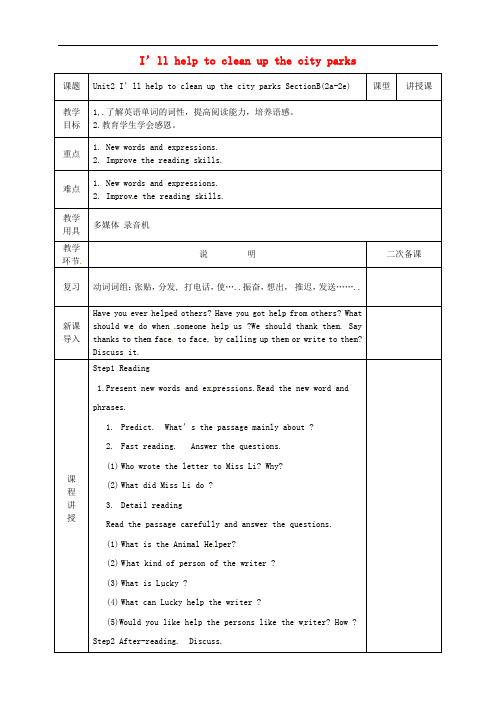
Talk about your hometown.
Where is your hometown?
Do you like your hometown?
What are some of the special places in your hometown?
Step 3Group work
1a,Check (√) the places or things you can find in your town or city.
First let the students go through the words .
Check the answers and read the words aloud.
especially副词,意为“尤其;特别;格外”,在句中作状语,用于列举某个特例或某事物的特殊性。形容词为special“特别的,特殊的”。
8. consider动词,意为“考虑”,=think about,后跟名词,代词,动名词,宾语从句或“疑问词+不定式”。
9. in my opinion
2b,Find expressions in the passage that have the same meanings as these words and phrases.
1. look forsearch for5. go backreturn
2. considerregard6. changesdevelopments
3. across fromopposite7. areaplace
4. in one’s opinionaccording to
Then read the words and phrases aloud
初中八年级英语Unit2 教案+说课稿 人教新目标版
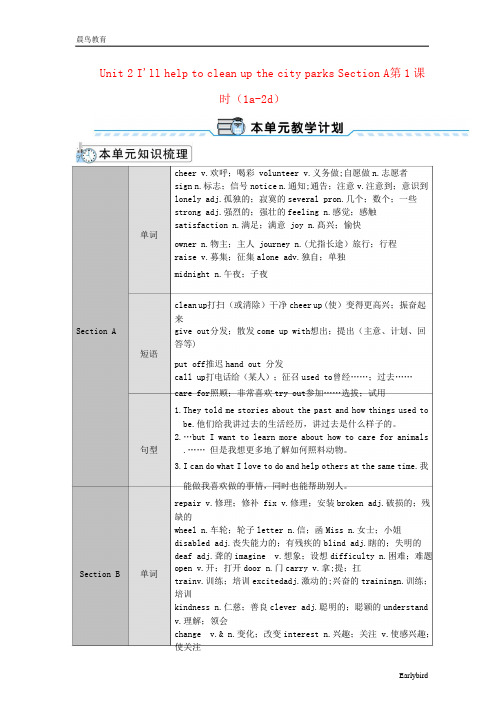
Unit 2 I'll help to clean up the city parks Section A第 1 课 时(1a-2d)
单词
cheer v.欢呼;喝彩 volunteer v.义务做;自愿做 n.志愿者 sign n.标志;信号 notice n.通知;通告;注意 v.注意到;意识到 lonely adj.孤独的;寂寞的 several pron.几个;数个;一些 strong adj.强烈的;强壮的 feeling n.感觉;感触 satisfaction n.满足;满意 joy n.髙兴;愉快
to ask them to protect our earth.
A. printing out B. giving out
C. selling out
D. putting out
活 3.(黑龙江绥化中考)—My aunt goes to climb mountains every Sunday.
B
(
3a
~
3b)……………………………………………………………………………………1课时
词汇短语:主要采用图片及多媒体展示助记法。 基本句子:采用多媒体展示及交际法(利用多媒体展示两人进行交际时的情景)。 语法:动词不定式——采用图标记忆法。
Section A 第一课时(1a~2d)
类别 重点单词
学习重点 cheer, volunteer, sign, notice, lonely
Earlybird
晨鸟教育
sir n.先生(用于正式信函中对不知名的男性收信人的称呼时,写 为 Sir) madam n.夫人;女士(用于正式信函中对不知名的女性收信人的称
呼时,写为 Madam)
人教版新目标八年级英语第2单元Unit2教案
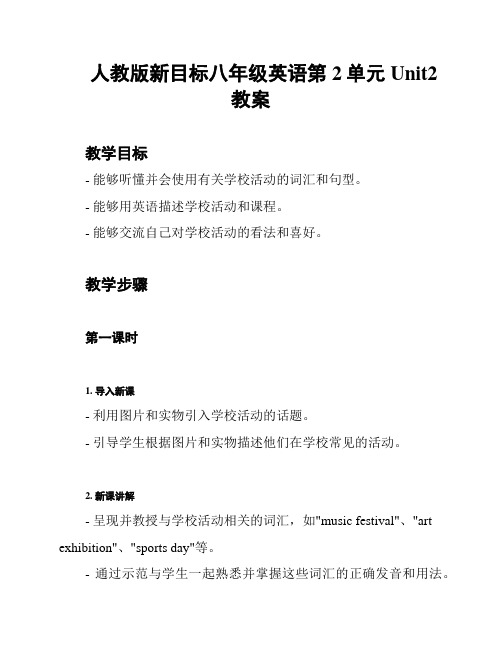
人教版新目标八年级英语第2单元Unit2教案教学目标- 能够听懂并会使用有关学校活动的词汇和句型。
- 能够用英语描述学校活动和课程。
- 能够交流自己对学校活动的看法和喜好。
教学步骤第一课时1. 导入新课- 利用图片和实物引入学校活动的话题。
- 引导学生根据图片和实物描述他们在学校常见的活动。
2. 新课讲解- 呈现并教授与学校活动相关的词汇,如"music festival"、"art exhibition"、"sports day"等。
- 通过示范与学生一起熟悉并掌握这些词汇的正确发音和用法。
- 操练这些词汇,并与学生一起编制句子来描述学校活动。
3. 听力训练- 播放关于学校活动的对话,要求学生仔细听并选择正确的图片。
- 学生互相对话,讨论听到的对话内容。
4. 对话练- 分组或两人一组,让学生模仿对话,表演关于学校活动的场景。
- 鼓励学生用英语进行自由对话,并互相分享自己参与过的学校活动。
5. 作业布置- 课堂分发作业卷,要求学生写一篇短文,介绍自己最喜欢的学校活动,并陈述原因。
第二课时1. 短文分享- 学生轮流与同桌分享自己写的短文。
- 鼓励其他学生提出问题或表达对短文的意见和建议。
2. 阅读训练- 学生阅读一篇关于学校活动的短文,并回答相关问题。
- 教师引导学生理解短文的内容,帮助他们解决阅读中遇到的问题。
3. 语法讲解- 教授句子结构"What do you think of + 学校活动?"和相应的答语。
- 帮助学生理解并掌握这种句子结构的用法。
4. 语法练- 学生分组或两人一组,互相提问"What do you think of + 学校活动?"并回答对方。
- 引导学生用所学词汇和句型互相交流和讨论自己对学校活动的看法和喜好。
5. 总结课堂内容- 教师带领学生回顾本节课所学的词汇、句型和语法。
- 1、下载文档前请自行甄别文档内容的完整性,平台不提供额外的编辑、内容补充、找答案等附加服务。
- 2、"仅部分预览"的文档,不可在线预览部分如存在完整性等问题,可反馈申请退款(可完整预览的文档不适用该条件!)。
- 3、如文档侵犯您的权益,请联系客服反馈,我们会尽快为您处理(人工客服工作时间:9:00-18:30)。
Unit 2教材分析In the unit, students learn to express what kind of volunteer work they would like to do. And they will know much about the volunteers and volunteer work. And they will learn to choose a volunteer job based on their own skills. Students will understand to do some volunteer work is good for both themselves and the others. All the students will be interested in the volunteers and volunteer work, and they will make great progress in English after learning this unit.教学目标1. Knowledge and Ability Objects(1)Master the new words and expressions.clean up, city, cheer, cheer up, give out, volunteer, notice, used to, lonely, several, feeling, satisfaction, joy, owner, journey, sign, sick, raise, alone, repair, fix, give away, wheel, letter, set up, make a difference, blind, deaf, imagine, difficulty, open, door, carry, train, excited, training, kindness, clever, understand, change, disabled, strong. (2)Learn to express the volunteer work they would like to doand give suggestions to the others.(3)To train the students to use the phrasal verbs, and to thestudents' listening, speaking and writing skills using the target language.(4)Learn to deal with new problems or situations using what youhave learned.2.Method Objects in Teaching(1) Cultivate students' listening, speaking, reading andwriting skills through series of practice.(2)Consolidated the target language by self check.(3)Employ task-based approach.3.Maral Objects(1)Being a volunteer is great.(2)Get students to be interested in volunteer work and dosomething really on it.教学重点1.To help students learn and grasp the phrasal verbs and the target language.2.To let students know something about the volunteer work. 教学难点1.To train students' listening, speaking, reading and writing skills with the target language.2.To train the students to use the phrasal verbs.Period 1Ⅰ.Teaching Aims and Demands1. Knowledge and Ability Objects(1)Master the new words and expressions:clean up, tidy, cheer, cheer up, give out, volunteer, notice, used to, lonely.I hope to work outside.You could help to clean up the city parks.(2)Be able to express one's willingness to help others who are in trouble by listening and speaking.(3)Improve students' listening and communicative skills. 2. Method Objects in Teaching(1)Learn the new words and phrases using pictures.(2)Learn to talk about how to offer help with phrasal verbs and target language by working in pairs.3. Moral Objects(1)Offer help to those who are in trouble as soon as possible.(2)Think up some things one can do on Clean-up Day.Ⅱ.Teaching key points1.Master words and phrasal verbs.2.Master the target language.Ⅲ.Teaching difficult pointsHow to offer help using the new phrases and target language. Ⅳ.Teaching Methods1.Inferring vocabulary2.Role play3.Pair workⅤ.Teaching Aids1.Textbook2.A tape3.A tape record4.Blackboard5.ChalkputerⅥ.Teaching ProceduresStep1 Learning the New WordsFirst, turn on the computer in order to show some pictures. Second, teach students to read new words in English when they look at the pictures.Third, ask some students to read the new words by themselves, and correct their mistakes.Fourth, ask students to read the new words together.Step 2 Section A 1aFirst, give students 2 minutes to read and translate the sentences and phrases in the pictures of Section A 1a. Second, give students 2 minutes to write down their answers of the exercises in Section A 1a.Third, check students’ answers. Ask some students to read their answers, correct their mistakes.Step 3 Leading to the New LessonFirst, show students some pictures by computer, then ask students to say phrases in English.Phrases: visit sick children in the hospital, help clean up the city parks, give out food, cheer up old people...... Second, ask students to continue to look at the pictures, then answer teacher’s questions.T: I hope to help homeless people?S1: You could give out food to them.T: I want to cheer up sick kids?Ss: You could ask hospital to let you visit the kids.……Step 4 Section A 1bFirst, give students 1 minute to read and understand the demand of 1b.Second, play the recording of 1b, and ask students to complete the listening practice of 1b.Third, check students’ answers.Answers of 1b:3,2,4,1Fourth, ask students to read the tape scripts of 1b together, and ask students to underline the key phrases and sentences. Step 5 Pair workFirst, give students 1 minute to make new conversations using the information in 1b.Teacher can give students an example: T: I'd like to help kids with their schoolwork.S1: You could volunteer in an after-school study program to teach kids.Third, ask some students to show their new conversations, and ask other students to correct their mistakes.Step 6 Section A 2a-2bFirst, give students 2 minutes to read and the demands of 2a and 2b and look at the five pictures of 2a. Make sure the students understand the listening tasks.Second, play the recording of 2a, ask students to complete the listening practice of 2a.Third, play the recording of 2b, and ask students to complete the listening practice of 2b.Fourth, check students’ answers. Ask some students to read their answers, correct their mistakes.Answers of 2a: b, c, eAnswers of 2b: e up with 2.put off 3.put up 4.hand out 5.call upFifth, ask students to read the tape scripts of 2a and 2b together, and ask students to underline the key phrases and sentences.Step 7 Section A 2cFirst, ask students to read the conversation of 2c together. Second, give students 1 minute to make new conversations using the information in 2a and 2bA: We need to come up with a plan for the City Park Clean-Up Day.B: Let's have lunch first.A: No, we need to start now. Clean-Up Day is only two weeks from now.……Third, ask some students to show their new conversations, and ask other students to correct their mistakesStep 8 Section A 2dFirst, ask 2 students to read the conversation of 2d.Second, give students 2 minutes to translate the conversation by themselves.Third, ask some students to read their translations, and ask other students to correct their mistakes.Fourth, ask students to underline the key phrases. Phrases: ask sb to do sth, talk to sb, used to do sth, care for, listen to sb/sthFifth, give students 2 minutes to prepare for, ask some students to act the conversation of 2d.Step 9 SummaryT: In this class, we've learned how to express offering help. In the process of teaching, we've learned some phrases and done much listening and speaking practice using the target language. Step 10 HomeworkCopy new word, one word 5 times.Step 11 Writing on the blackboardUnit 2 I'll help clean up the city parks.A: I hope to help homeless people?B: You could give out food to them.C I want to cheer up sick kids?D: You could ask hospital to let you visit the kids.Period 2Ⅰ.Teaching Aim and Demands1. Knowledge and Ability Objects(1)Master the new words and phrases:several, feeling, satisfaction, joy, owner, journey, sign, sick, raise, alone(2)Get some information about volunteering career.(3)Develop students' reading and comprehensive skills.(4)Master the use of phrasal verbs.(5)Be able to help others as soon as possible.2. Method Object in Teaching(1)Learn to talk about how to offer help through a reading material.(2)Employ task-based approach.(3)Do some exercises to consolidate the target language. 3.Moral Object(1)Being a volunteer is helpful for one's job.(2)It will bring much enjoyment to come up with a good idea to help others.Ⅱ.Teaching key points1.Master the new words and the target language.2.Be able to express the willings to help other.Ⅲ.Teaching difficult points1.How to express the preferences on some kinds of volunteer work.2.Master the use of phrasal verbs and the target language. Ⅳ.Teaching Methods1.Reading and writing methods2.Working in pair or group3.Task-based learning approachⅤ.Teaching Aids1.Textbook2.Blackboard3.chalksⅥ.Teaching ProceduresStep 1 Section A 3a-3cFirst, ask students to try to translate some key phrases about 3a.Key phrases:Riverside High School 河畔中学,give up doing sth 放弃做某事,an animal doctor 一名兽医, care for 关心,照顾,the look of joy 愉悦的表情, at the age of 在...岁时,decide to 决定做某事,learn to do sth 学习做某事,at the same time 同时Second, ask some students to read their translations, correct their mistakes.Third, give students 5 minutes to read the passage of 3a, then ask students to answer the questions of 3b.Fourth, check students’ answers.Answers of 3b:1.Mario believes it can help him to get his future dream job. Marry can do what she loves to do and help others at the same time.2.Mario said it was hard work and he wanted to learn more about how to care for animals. Marry said she can do what she loved to do and helped others at the same time.Fifth, give students 3 minutes to read the passage again, then complete the exercises of 3c.Sixth, ask some students to read their answers of 3c, and correct their mistakes.Answers of 3c:1.to be 2.to learn, to care 3.to try out 4.to help 5.to doSeventh, ask students to read the passage deeply, then explain it for students.Step 2 Grammar FocusFirst, ask students to read the sentences in Grammar Focus together.Second, give students 5 minutes to translate the sentences in Grammar Focus into Chinese, then ask some students to read their translations and correct their mistakes.Third, explain the key grammar in unit 2.Step 3 Section A 4a-4bFirst, give students 5 minutes to complete the exercises of Section A 4a-4b.Second, check students’ answers. Ask some students to read their answers of 4a and 4b, correct their mistakes.Answers of 4a:1.put off2.call upe up with, cheer up4.put up, hand out, give out.Answers of 4b:1.to make2.to do3.to help4.to spend5.to visit6.to move Third, ask students to read 4a and 4b together.Step 4 Section A 4cFirst, give students 1 minute to read the demand of 4c. Second, give students 5 minutes to make their own sentences. Third, ask some students to read their sentences, and correct their mistakes.e.g1.I'd like to volunteer to be a doctor.2.At 12:00 a.m., I called my friend to have lunch with me.3.I'm very busy but I could help to do chores,4.Summer vacation is coming, and I want to go to Hong Kong on vacation.5.I want to travel alone. My parents told me (not) to do that.Step 5 SummaryT: In this period, we’ve learned some key expressions through a reading material, and we’ve developed our comprehensive skill. We also learned the use of phrasal verbs through some practice. We developed our speaking and writing skills.Step 6 HomeworkComplete the exercises of unit 1 Section A in workbookStep 7 Writing on the BlackboardUnit 2 I'll help clean up the city parks. Riverside High School 河畔中学,give up doing sth 放弃做某事, an animal doctor 一名兽医, care for 关心,照顾,the look of joy 愉悦的表情, at the age of 在...岁时,decide to 决定做某事,learn to do sth 学习做某事,at the same time 同时Period 3Ⅰ.Teaching Aims and Demands1. Knowledge and Ability Objects(1)Master the key words and phrases:repair, fix, give away, wheel(2)Be able to help other as soon as possible.2. Method Objects in Teaching(1)Learn the new phrases.(2)Master the target language through listening and speaking practice.3. Moral objectIt will bring much enjoyment to come up with a good idea to help others.Ⅱ.Teaching key points1.Master the new words and target language.2.Help students understand the article.3.Guide students to make notes based on an article.Ⅲ.Teaching difficult pointTrain students' listening and speaking skills by using the target language and some phrasal verbs.Ⅳ.Teaching Methods1.Reading method.2.Listening method.3.Pair work.Ⅴ.Teaching Aids1.A tape recorder.2.Textbook.3.Blackboard and Chalks4.A tapeⅥ.Teaching ProceduresStep 1 Section B 1aFist, give students 1 minute to read the demand of 1a.Second, ask some students to translate the sentences in 1a. Third, give 1 minute to complete the exercises of 1a. Fourth, check students’ answers. Ask some students to read their answers of 1b, and correct their mistakes.Answers of 1a:b,c,a,dFifth, ask students to read the sentences of 1a in order. Step 2 Section B 1b and 1cFirst, give students 1 minute to read the demands of 1b and 1c, and make students understand the listening tasks.Second, ask students to read and translate the sentences in 1c. Third, play the recording of 1b, ask students to complete the listening practice of 1b.Fourth, play the recording of 1c, and ask students to complete the listening practice of 1c.Fifth, check students’ answers.Answers of 1b: 4,2.1,3Answers of 1c: 1.T 2.F 3.F 4.TSixth, ask students to read the tape scripts of 1b and 1c together, and ask students to underline the key phrases and sentences.Step 3 Section B 1dFirst, ask students to read the conversation of 1c together. Second, give students 2 minutes to prepare for the conversation like 1d, then ask some students to show their conversations.Step 4 Section B 2aFirst, give students 1 minute to read and understand the demand of 2a.Second, give students 2 minutes to discuss the question of 2a, 2 students in a group.Third, ask some students to read their answers .Teacher and other students discuss their answers, and correct their mistakes.Step 5 SummaryT: In this period, we’ve mainly consolidated the target language through some listening and speaking practice.Step 6 HomeworkComplete the exercises of section B in workbook.Step 7 Writing on the Blackboard.Unit 2 I'll help clean up the city parks.I ran out of all the money.I take after my father.He fixed up my bike.I gave away my old clothes to the homeless people.Period 4Ⅰ.Teaching Aims and Demands1. Knowledge and Ability Objects(1)Master the key words and expressions:letter, miss, set up, make a difference, blind, deaf, imagine, difficulty, open, door, carry, train, excited, training, kindness, clever, understand, change, disabled, strong.(2)Improve students' writing and cooperative skills.(3)Consolidate the target language.2. Method Object in Teaching(1)Learn to write a letter or e-mail to express our willingness to help others using the learning knowledge.(2)Review and consolidate the main contents in this unit.3.Moral ObjectTry to come up with an idea when doing something to get much volunteer experience.Ⅱ.Teaching key points1.Master the new words and target language.2.Review the learned contents.Ⅲ.Teaching difficult pointsHow to help students have a self check on the phrasal verbs and target language of this unit.Ⅳ.Teaching Methods1.Reading method.2.Writing method.3.Working in group.Ⅴ.Teaching Aids1.Textbook.2.Blackbook.3.Chalks.Ⅵ.Teaching ProceduresStep1 Section B 2bFirst, give students 3 minutes to read the passage of 2b quickly, then ask students to try to translate the following phrases:1.thank for sth/doing sth 为了某事/某人做的某事而感谢2.set up 建立,创立3.make a difference 影响4.answer the telephone 接电话5.carry things 搬东西6.be able to do sth 能够做某事7.because of 因为8.a photo of sb 某人的一张照片9.be excited about sth 对...感到兴奋/激动Second, give students 5 minutes, ask students to read the passage of 2b again, four students a group, discuss the answers to the questions of 2b.Third, ask some students to read their answers, and teacher and other students correct their mistakes.Answers of 2b:1.Ben Smith. He wrote to Miss Li in order to thank her.2.Miss Li gave away money to Animal Helper.Fourth, give students 10 minutes to try to translate the passage. Divide all the students to four groups, one group will translate one paragraph.Fifth, ask one student in each group to read their group's translations. Teacher corrects their mistakes.Step 2 Section B 2c-2dFirst, give students 1 minute to read the demand of 2c. Second, give students 5 minutes to complete the exercises of 2c.Third, check students' answer.Answer of 2c:1.n 2.adj 3.n 4.v 5.n 6.adj 7.n 8.n(以下答案仅供参考)1.A group of students are playing soccer on the playground.2.We should help disabled people.3.My English teacher made a big difference to my life.4.We can't only imagine our future life.5.In our lives, we will meet many difficulties.6.It's normal to feel nervous before an exam.7.You must finish the training before joining our club.8.Many poor children can go to school because of her kindness. Fourth, give students 2 minutes to complete the exercises of 2d.Fifth, check students' answers. Ask some students to read their answers, and teacher and other students correct their mistakes. Answer of 2d:2.Ben Smith is unable to move well.3.Lucky can get things for disabled people.4.Animal Helper trains animals like Lucky.Step 3 Section B 3aFirst, ask students to read the volunteer work of 3a together and translate them.Second, give students 2 minutes to add more volunteer work. Third, ask some students to read their answers.Step 4 Section B 3bFirst, give students 1 minute to read the demand of 3b for understanding the writing task.Second, give students 5 minutes to complete the writing task of 3b.Third, ask some students to read their writings, teacher and other students correct their mistakesStep 5 SummaryT: In this period, we've mainly developed our reading and comprehensive skills through a passage. By do some writing practice, we consolidated the target language.Step 6 HomeworkComplete the exercises of self check on the textbook.Step 7 Writing on the BlackboardUnit 2 I'll help clean up the city parks.1.A group of students are playing soccer on the playground.2.We should help disabled people.3.My English teacher made a big difference to my life.4.We can't only imagine our future life.5.In our lives, we will meet many difficulties.6.It's normal to feel nervous before an exam.7.You must finish the training before joining our club.8.Many poor children can go to school because of her kindness.Period 5Ⅰ.Teaching Contents1.Check students' answers of self check.2.Ask students to read the words and Grammar Focus of unit2 together.3.Ask students to do some exercises to review the knowledge they have learned in unit 2.4. Explain the exercises deeply.Ⅱ.Teaching key points1.To review and grasp the phrasal verbs and the target language.2.To let students know something about the volunteer work. Ⅲ.Teaching difficult pointsTo train the students to use the phrasal verbs and the targetlanguage correctly.Ⅵ.Teaching ProceduresStep 1 Check SelfFirst, check students’ answers of self check. Ask some students to read their answers, then correct students’ mistakes. Answers of self check:Answers of self check:1.(1)put/cut/get/give up (2)cut/put/get off (3)give away (4)get/run out of (5)take after (6)come up with2.ran out of, to buy, to cheer, put up, called up, totell, handed out, set up, came up, to fix, gave away Second, ask students to read self check together.Step 2 ReadingFirst, ask students to read the words of unit 2 together. Second, ask students to read Grammar Focus and the key phrases of unit 2.Step 3 Do Some ExercisesFirst, give students 20 minutes to complete the followingexercises.一. 选词或词组填空cut up, give out, come up, clean up, put off, cheer up,call up, help with, set up, write down.1. Please ______ the table after supper.2. He______ with a good idea yesterday.3. Your daughter is sad. Why not ___her___?4. Teachers _______ apples to every child.5. The meeting is_______ as war.6. ______ these potatoes. I’ll cook them.7. Terasa_______ a school for poor children.8. I will _______ some housework after I finish my work.9. Please _______ what I said just now.10. He _______ his wife as soon as he arrived Shanghai.二. 单项选择( ) 1.He looks sad. Let’s cheer him ____ .A. upB. inC. outD. at( ) 2.Tony could help ______ the city parks.A. cleanB. clean upC. clean outD. cleans up.( ) 3. I _____ like to help kids with their schoolwork.A. couldB. wouldC. shouldD. will( ) 4. Not only the students ____ also their teacher likes football.A. tooB. exceptC. howeverD. but( ) 5. we need to ____ up with a plan on Clean-up Day.A. comeB. goC. workD. study( ) 6. I _______ some clothes to charity because they are too small for me.A. take afterB. hang outC. give awayD. put off( ) 7. Now I spend time _____ what I love to do.A. to doB. doingC. doD. did( ) 8. After my teacher gave me a lesson, I didn’t do that _______.A. anyB. moreC. any moreD. no more( ) 9. ____ of them like to play basketball.A. EachB. EveryoneC. EveryD. Both( ) 10. It often snows in ____ winter.A. aB. anC. theD. /) 11. I first met Joe three years ago. He ____ at a CD shop at the time.A. will workB. is workingC. has workedD. was working( ) 12. Amy ____the windows already, so the room looks much bright.A. cleansB. has cleanedC. is cleaningD. will clean( ) 13. The zoo was far away from my hotel. It ____ me at least two hours to get there.A. tookB. has takeC. takesD. will take( )14. –I’m sorry to keep you waiting.–Oh, not at all. I ____ here for only a few minutes.A. wasB. isC. have beenD. had been( )15. My mother _____dinner when I got home.A. was cookingB. cookedC. has cookedD. cooks Second, check students’answers, and correct students’mistakes.Answers:一. 1.clean up 2.came up 3.cheer up 4.gave out 5.put off 6.Cut up 7.set up 8. help with 9.write down 10.called up二. ABBDA CBCDD DBACAStep 4 SummaryT:In this period, we've mainly reviewed the main key word and phrases. By do some exercises, we consolidated the target language.Step 5 HomeworkComplete the exercises of unit 1 self check in workbook. Step 6 Writing on the blackboardUnit 2 I'll help clean up the city parks.Exercises。
